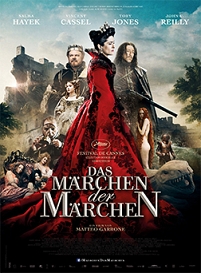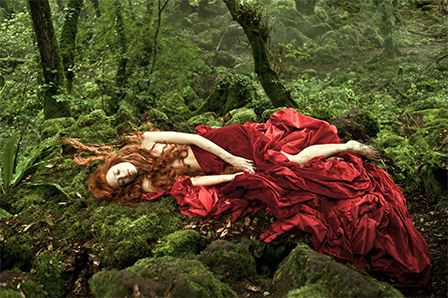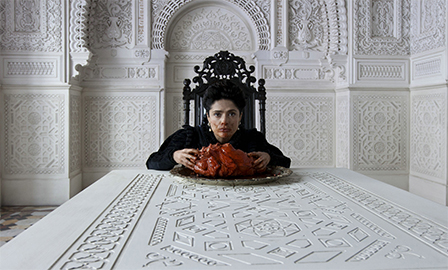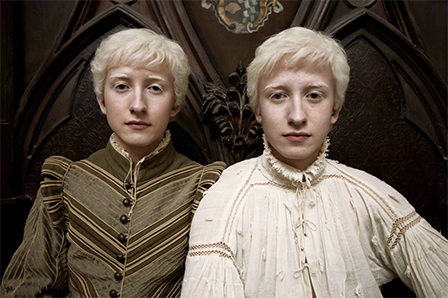Erstellt am: 13. 8. 2015 - 08:00 Uhr
FM4 Kinopremiere: Das Märchen der Märchen

© Filmladen Filmverleih
Man muss sich den italienischen Originaltitel auf der Zunge zergehen lassen. "Il racconto dei racconti", das klingt einfach herrlich und wurde mit "Das Märchen der Märchen" auch getreu übersetzt. Tatsächlich geht es in diesem Film um so etwas wie die Ursprünge der magischen, faszinierenden und auch verstörenden Fantasiegeschichten, mit denen später die Gebrüder Grimm berühmt wurden und die Generationen von Kindern und Erwachsenen in ihren Bann zogen.
Mitte des 17. Jahrhunderts erschien eine italienische Erzählsammlung, herausgegeben vom neapolitanischen Ritter und Hofpoeten Giambattista Basile, die zum Urstoff für die europäische Märchenliteratur wurde. Ausgerechnet Matteo Garrone verfilmte nun einige zentrale Geschichten daraus. Mit seinem extrem ernüchternden, sozialrealistischen Mafiaepos "Gommora" schockte und begeisterte der italienische Meisterregisseur die Welt. Jetzt begibt sich Garrone auf die opulenten Spuren seiner Landsmänner Federico Fellini, Pier Paolo Pasolini oder Mario Bava.

© Filmladen Filmverleih
"The Tale of Tales", wie der Film im englischsprachigen Bereich heißt, ist ein bildgewaltiger, derber, gruseliger Streifen geworden, voll depressiver und sexsüchtiger Herrscher und bizarrer Monster, von dem Hollywood mit seinen sterilen, aalglatten Märchenadaptionen nur träumen kann. Stars wie Salma Hayek, Vincent Cassel, Toby Jones oder John C. Reilly taumeln durch fantastische italienische Originalkulissen; Schönheit und Schrecken liegen nah beinander.
Beim Münchner Filmfest traf ich einen bestens gelaunten Matteo Garrone, der im Interview seine nicht geringen Ambitionen betont: Einen Märchenfilm zu drehen, der an die Frühzeiten des Kinos, an die kunstvollen Wunderwerke eines Georges Méliès ebenso anknüpft wie an die erwähnten Leinwand-Traditionen seines Landes. Und er erzählt auch, warum für ihn der trostlos-realistische "Gommora" und der berückende "Il racconto dei racconti" gar nicht soweit auseinanderliegen.
Matteo Garrone im Interview
Christian Fuchs: There are versatile directors, and there is Matteo Garrone, who can vary from the gritty "Gomorrha" to a dreamy fairytale. Is there a common theme in your films?
Matteo Garrone: I think the leading thing is desire, desire that becomes obsession. But at the same time all the stories are magic stories that talk about human beings, about conflicts.
Can you tell me a bit more about Giambattiste Basile, the author of "Pentamerone" or "The Tale of Tales"? In Austria and Germany fairytales have been made popular by the Brothers Grimm or Ludwig Bechstein, but we hardly know anything about "The Tale of Tales" and its author.
Giambattista Basile is the author of the first book about fairytales in Europa. He wrote it in the 17th century. It’s the first that tells the story of Cinderella and many other fairytales that became very famous later with other authors, for instance the Brothers Grimm. The Brothers Grimm declared their admiration for Basile in an introduction to their first edition of tales where they talked about how important his work was. I think Basiles book is really amazing and surprising, full of incredible stories and incredible images. So I thought the time has finally arrived to give him back some of the honour that he deserves.
Did you grow up with fairytales yourself? What do you think of fairytales for children? Some people say they’re too cruel for children, others say they’re important. What’s your opinion?
It’s a little bit different with Basile, because Basile wrote his stories in the 17th century. In that period there was no distinction between adults and children. So these stories were written mostly for the entertainment of adults, not for kids. That’s why they’re so cruel. They reflect the period. They come from the popular culture and they have a medieval background, so they’re very violent sometimes and very dark. Then, in the next century, the authors that followed started to write for children. The stories remained dark, but in a different way.

© Filmladen Filmverleih
What’s the youngest age a kid could see the film?
I would say thirteen.
In Hollywood, fairytale-films are full of CGI-effects. They exist in your film as well, but as a viewer, you can almost smell and taste your film, because there are so many textures and dust and real castles. Was that very important for you to make it real, in a way?
Absolutely. I worked in an exactly opposite way than in my other movies. In other movies like "Gomorrha" I started from the reality, from realism, and then I tried to bring this realism to a more visionary dimension, a black fairytale, more abstract. This time I started from magic tales and I tried to bring this tales in a realistic dimension and a material way. So it was very important for me that the audience believes in what they see on the screen. We wanted to create some images that can bring you to the beginning of the cinema, like Méliès – the origin of the cinema. The show has to be a show and the audience has to be surprised. For me the most important thing is that the audience remains surprised and will see something that is completely unusual.

© Filmladen Filmverleih
Like all fairytales it’s a tale about moral and immorality, but you take no real stand. Was that important for you to make it a "grey" zone?
Yeah, I like to create characters that have human conflicts. This is a movie that talks about us. It’s very modern. The tales talk about feelings pushed to extremes. So there was no such big difference between "Gomorrha" and "Tale of Tales", because they’re all talking about human conflicts, about desire. And desire becomes obsession. And obsession becomes something that leads a human being to a tragic destiny.
There are Hollywood-stars in this film, but you talked about Georges Méliès, who also came to my mind, but also a tradition of Italian cinema, of European cinema. Was it important to restore this tradition of fantastic European cinema in a way, compared to Hollywood?
That’s how I grew up. In Italy we have such great directors, such great masters that inspired me. We can talk about Fellini, we can talk about directors like Mario Bava, who was one of the first to make genre movies - fantasy, horror. So there are a lot of great masters in my country and I tried to do a movie that tries to be in the line of the tradition of the great Italian cinema.
FM4 Kinopremiere von "Tale of Tales" - Tickets gewinnen!
Wir verlosen noch 60x2 Tickets zur FM4 Kinopremiere von "The Tale of Tales" (OmU, 125min) am Mittwoch, den 19.8.2015 um 20 Uhr im Cine Center, 1010 Wien.
Dafür solltest du folgende Frage beantworten: Wo hat sich das siebte Geißlein versteckt?
Der Einsendeschluss ist bereits vorbei. Die richtige Antwort lautete: im Uhrenkasten. Die GewinnerInnen wurden per Mail verständigt. Vielen Dank fürs Mitmachen und viel Spaß im Kino.

